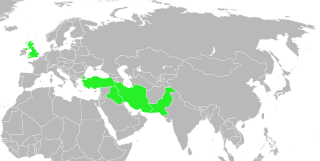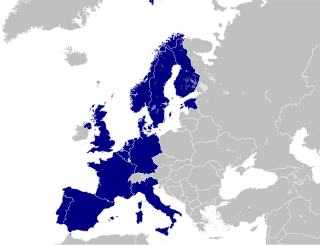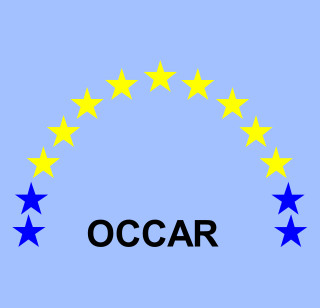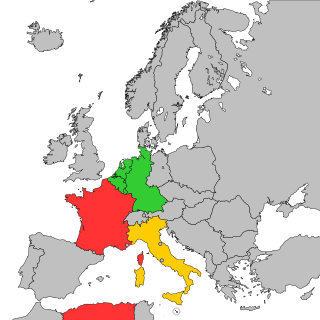 W
WABCANZ Armies is a program aimed at optimizing interoperability and standardization of training and equipment between the armies of Australia, Canada, New Zealand, the United Kingdom, and the United States, plus the United States Marine Corps and the Royal Marines. Established in 1947 as a means to capitalize on close cooperation between the United States, United Kingdom, and Canada during World War II, the program grew to include Australia and New Zealand.
 W
WThe Allied Control Council or Allied Control Authority and also referred to as the Four Powers, was the governing body of the Allied Occupation Zones in Germany and Allied-occupied Austria after the end of World War II. Members were the Soviet Union, the United Kingdom, the United States and France. The organisation was based in Berlin-Schöneberg. The council was convened to determine several plans for postwar Europe, including how to change borders and transfer populations in Eastern Europe and Germany. As the four Allied Powers had joined themselves into a condominium asserting 'supreme' power in Germany, the Allied Control Council was constituted the sole legal sovereign authority for Germany as a whole, replacing the extinct civil government of Nazi Germany.
 W
WThe Allied Kommandatura, or often just Kommandatura, also known as the Alliierte Kommandantur in German, was the governing body for the city of Berlin following Germany's defeat in World War II. The victorious allied powers established control of post-war Germany and other territories via shared Military Government councils, including for Berlin. The Kommandatura was often known as the little brother to the Allied Control Council, which had the same function for the whole of Germany, and was subordinate to it. It originally comprised representatives from the United States, the United Kingdom, and the Soviet Union but later included France. The Kommandatura had its home in the Berlin district of Dahlem.
 W
WThe Central Treaty Organisation (CENTO), originally known as the Baghdad Pact or the Middle East Treaty Organisation (METO), was a military alliance of the Cold War. It was formed in 1955 by Iran, Iraq, Pakistan, Turkey and the United Kingdom and dissolved in 1979.
 W
WThe Confédération Interalliée des Sous-Officiers de Réserve (CISOR), until 2013 also known as Association Européenne des Sous-Officiers de Réserve (AESOR), is the parent organisation of the national European NCO Reserve Corps within the NATO and also international. Currently CISOR consists 14 countries under the presidential lead of Switzerland. This non-profit organisation was founded 1 June 1963.
 W
WThe Collective Security Treaty Organization is an intergovernmental military alliance that was signed on 15 May 1992. In 1992, six post-Soviet states belonging to the Commonwealth of Independent States—Russia, Armenia, Kazakhstan, Kyrgyzstan, Tajikistan, and Uzbekistan—signed the Collective Security Treaty. Three other post-Soviet states—Azerbaijan, Belarus, and Georgia—signed the next year and the treaty took effect in 1994. Five years later, six of the nine—all but Azerbaijan, Georgia, and Uzbekistan—agreed to renew the treaty for five more years, and in 2002 those six agreed to create the Collective Security Treaty Organization as a military alliance.
 W
WThe 80th Flying Training Wing is a wing of the United States Air Force based out of Sheppard Air Force Base in Wichita Falls, Texas.
 W
WEuropean Air Group is an association of the air forces of 7 member nations working together to stimulate change and collectively to enhance the tactical capabilities of the Group’s air forces through better cooperation.
 W
WThe European Intervention Initiative (EI2) is a joint military project between 14 European countries outside of existing structures, such as the North Atlantic Treaty Organization (NATO) and the European Union's (EU) defence arm. EI2 is planned to operate a "light" permanent secretariat based on the network of military liaison officers with the French defence ministry.
 W
WThe Five Power Defence Arrangements (FPDA) are a series of defence relationships and mutual cooperation established by a series of multi-lateral agreements between Australia, Malaysia, New Zealand, Singapore, and the United Kingdom signed in 1971, whereby the five powers are to consult each other "immediately" in the event or threat of an armed attack on any of these five countries for the purpose of deciding what measures should be taken jointly or separately in response.
 W
WThe International Maritime Security Construct (IMSC) is a consortium of countries officially tasked with maintaining order and security in the Arabian Gulf, Gulf of Oman, Gulf of Aden and Southern Red Sea, particularly regarding maritime security of global oil supply routes. It was formed on 16 September 2019 in Bahrain, by the United Kingdom, Australia, Albania, Saudi Arabia, Bahrain, Lithuania, the United Arab Emirates, and the United States. The operational arm of the IMSC is Coalition Task Force SENTINEL.
 W
WThe North Atlantic Treaty Organization, also called the North Atlantic Alliance, is an intergovernmental military alliance between 30 North American and European countries. The organization implements the North Atlantic Treaty that was signed on 4 April 1949. NATO constitutes a system of collective defence whereby its independent member states agree to mutual defence in response to an attack by any external party. NATO's Headquarters are located in Evere, Brussels, Belgium, while the headquarters of Allied Command Operations is near Mons, Belgium.
 W
WThe Organisation for Joint Armament Cooperation is a European intergovernmental organisation that facilitates and manages collaborative armament programmes through their lifecycle between the nations of Belgium, France, Germany, Italy, Spain, and the United Kingdom.
 W
WThe European Personnel Recovery Centre (EPRC) is an intergovernmental military organisation that contributes to the development and harmonisation of policies and standards related to personnel recovery. The ERPC also provides support for education, training, exercises and operations. The EPRC was established on 8 July 2015 and is based at Poggio Renatico Air Base in Italy.
 W
WThe Proliferation Security Initiative (PSI) is a global effort that aims to stop trafficking of weapons of mass destruction (WMD), their delivery systems, and related materials to and from states and non-state actors of proliferation concern. Launched by United States President George W. Bush in May 2003 at a meeting in Kraków, Poland, the PSI has now grown to include the endorsement of 105 nations around the world, including Russia, Canada, the United Kingdom, Australia, France, Germany, Italy, Argentina, Japan, the Netherlands, Poland, Singapore, New Zealand, Republic of Korea and Norway. Despite the support of over half of the Members of the United Nations, a number of countries have expressed opposition to the initiative, including India, China and Indonesia.
 W
WThe Shanghai Cooperation Organisation (SCO) is an international alliance that consists of 8 member states and 3 observers from Eurasia. It was established on 26 April 1996 as Shanghai Five. Of the 8 member states and 3 observers, SCO currently also have 3 dialogue partners and 3 guest attendance entries.
 W
WThe Shanghai Cooperation Organisation (SCO), or Shanghai Pact, is a Eurasian political, economic, and security alliance, the creation of which was announced on 15 June 2001 in Shanghai, China by the leaders of China, Kazakhstan, Kyrgyzstan, Russia, Tajikistan, and Uzbekistan; the Shanghai Cooperation Organisation Charter, formally establishing the organisation, was signed in June 2002 and entered into force on 19 September 2003. The original five nations, with the exclusion of Uzbekistan, were previously members of the Shanghai Five group, founded on 26 April 1996. Since then, the organisation has expanded its membership to eight countries when India and Pakistan joined SCO as full members on 9 June 2017 at a summit in Astana, Kazakhstan.
 W
WThe Southeast Asia Treaty Organization (SEATO) was an international organization for collective defense in Southeast Asia created by the Southeast Asia Collective Defense Treaty, or Manila Pact, signed in September 1954.
 W
WThe Treaty establishing the European Defence Community, also known as the Treaty of Paris, is an unratified treaty signed on 27 May 1952 by the six 'inner' countries of European integration: the Benelux countries, France, Italy, and West Germany. The treaty would have created a European Defence Community (EDC) with a pan-European defence force. The treaty failed to obtain ratification in the French parliament and it was never ratified by Italy, so it consequently never entered into force. Instead, the London and Paris Conferences provided for West Germany's accession to NATO and the Western European Union.
 W
WThe Warsaw Treaty Organization (WTO), officially the Treaty of Friendship, Cooperation and Mutual Assistance, commonly known as the Warsaw Pact (WP), was a collective defense treaty signed in Warsaw, Poland between the Soviet Union and seven other Eastern Bloc socialist republics of Central and Eastern Europe in May 1955, during the Cold War. The Warsaw Pact was the military complement to the Council for Mutual Economic Assistance (CoMEcon), the regional economic organization for the socialist states of Central and Eastern Europe. The Warsaw Pact was created in reaction to the integration of West Germany into NATO in 1955 per the London and Paris Conferences of 1954, but it is also considered to have been motivated by Soviet desires to maintain control over military forces in Central and Eastern Europe.
 W
WFrom April 1948, the member states of the Western Union (WU), decided to create a military agency under the name of the Western Union Defence Organisation (WUDO). WUDO was formally established on September 27–28, 1948.